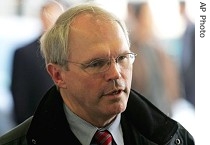2006年VOA标准英语-Expectations Low for Six-Party Talks on North K(在线收听)
By Bill Rodgers
Washington, D.C.
15 December 2006
watch Talks Preview
Six-party talks on North Korea's nuclear program officially open Monday in Beijing but expectations are reported to be low that a breakthrough can be achieved. The talks -- which will bring together China, Japan, South Korea, the United States, Russia and North Korea -- resume after a 13-month hiatus. During that time, Pyongyang tested a nuclear weapon that led the United Nations Security Council to impose sanctions on North Korea. U.S. officials are demanding concrete results from this latest round of talks but some analysts doubt the negotiations will lead Pyongyang to give up its nuclear weapons program.
 |
| Christopher Hill talks to reports before departing Beijing |
But North Korea later suspended the process after the United States imposed financial sanctions on Pyongyang as punishment for counterfeiting U.S. currency and other infractions.
With the resumption of talks in Beijing this weekend, lead U.S. negotiator Christopher Hill is calling for tangible results in implementing the September 2005 agreement. "We need concrete progress. We need a sign that we have moved off the pages of the September agreement and on to the ground of the Korean peninsula,” said Mr. Hill. “And we have always felt that as we move from that September agreement to the next phase, the next phase would in fact be implementation."
In October, North Korea announced it had tested a nuclear weapon -- and this followed a missile test earlier in the year. Because of this, some analysts are skeptical that North Korea will now decide to reverse course. Robert Gallucci, dean of the Foreign Service School at Georgetown University, is not optimistic about the upcoming talks.
"I don't think one should have an enormous amount optimism that the talks are going to produce an agreement that will end the North Korean nuclear weapons program, which is presumably the objective here. I think they [the talks] could improve the atmosphere a bit and make it perhaps less likely that the North Koreans will engage in continuing provocations."
At a briefing Wednesday, Assistant Secretary Hill declined to discuss specific U.S. objectives for the talks. But U.S. officials reportedly have said one sign of tangible progress would be if North Korea agrees to shut down operations at its Yongbyon reactor.
While significant, this would still fall short of expectations -- according to Robert Gallucci. "That's a substantive step and it would be a good one and one that the North Koreans could afford to do. So you can imagine steps that would, and should, be counted as progress. But a full-blown re-do of a framework with North Korea -- the kind of thing envisioned a year ago at the last round -- that seems quite a stretch."
This will be the sixth round of six-party talks, which began in 2003. Hill acknowledges they will be difficult, but stresses their importance. "This is a new phase in the six-party process, a very important phase, and a phase that if we can do this successfully I think we can look ahead to the full realization of this agreement."
But negotiating with North Korea presents challenges. Robert Gallucci, who led the negotiations that led to the 1994 nuclear framework agreement with North Korea, recalls the difficulties. "They have a different approach to a negotiation that is much more of an opportunity to use rhetoric, some amount of drama and this for on,e as a negotiator personally, it's interesting and it leads to, I would say, a premium on creativity in the negotiations."
The six-party talks officially open Monday in Beijing, although an informal session may be held Sunday evening.